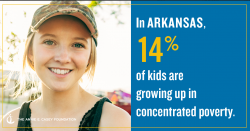
Fewer of Arkansas’s children are living in communities of concentrated poverty, according to “Children Living in High Poverty, Low-Opportunity Neighborhoods,” a new KIDS COUNT® data snapshot released today by the Annie E. Casey Foundation. Using the latest data available from the U.S. Census Bureau, the snapshot examines where concentrated poverty has worsened across the country, despite a long period of national economic expansion.
More than half of states are showing progress, with Arkansas reducing its rate by 18 percentage points during the time period studied. Nationally, the rate declined by 8 percentage points, indicating Arkansas is reducing concentrated poverty at a faster rate than the national average. However, despite the decline, Arkansas’s current rate is still 14 percent, two points higher than the national rate of 12 percent.
Growing up in a community of concentrated poverty — a neighborhood where 30 percent or more of the population is living in poverty — is one of the greatest risks to child development. Alarmingly, more than 8.5 million children live in these settings. Children in high-poverty neighborhoods tend to lack access to healthy foods and quality medical care, and they often face greater exposure to environmental hazards, such as poor air quality and toxins such as lead. Children in families facing financial hardships and fear of violence are more likely to experience chronic stress, which has been linked to diabetes, heart disease and stroke later in life. As adults, children who have lived in these conditions are more likely to have lower incomes than children who have relocated away from communities of concentrated poverty.
For the 100,000 Arkansas children still living in concentrated poverty, more work must be done to help them grow up in neighborhoods with high-quality schools, abundant job opportunities, reliable transportation and safe places for recreation.
The “Children Living in Concentrated Poverty, Low-Opportunity Neighborhoods” snapshot outlines solutions to address concentrated poverty and challenges leaders to confront issues such as the far-reaching effects of racial inequities and inequality.
African American and American Indian children are seven times more likely to live in poor neighborhoods than White children, and Latinx children are nearly five times more likely. These realities are largely the result of legacies of racial and ethnic oppression as well as present-day laws, practices and stereotypes that disproportionately affect people of color.
From redlining and limited access to financial institutions to workplace discrimination, racial inequality has locked millions of families of color into communities that lack resources to help all children thrive. Even relatively wealthy states like Texas and New York have a large share of children of color living in concentrated poverty.
Arkansas Advocates for Children and Families joins the Casey Foundation in calling on national, state and local stakeholders to act now to help families lift themselves out of these circumstances. Policies at the community, county and state level that can have a significant impact on the lives of children include:
- Supporting development and property-ownership models that preserve affordable housing, such as community land trusts and limited-equity cooperatives
- Ending housing discrimination based on whether a person was formerly incarcerated or is using a federal housing voucher
- Assisting low-income residents in paying higher property taxes that often come with new development/redevelopment or with a family’s relocation to a more affluent area
- Expanding workforce training that is targeted to high-poverty, low-opportunity communities
- Requiring and incentivizing anchor institutions, such as hospitals and universities, to hire locally and contract with businesses owned by women and people of color
- Developing and funding small-business loan programs that serve entrepreneurs in low-income neighborhoods and communities of color — or people that traditional lenders tend to reject, such as individuals with poor credit or criminal records.
Children and families are the foundation of communities. They should take part in the economic growth Arkansas has been experiencing over the past several years.
